Table of Contents
What Paddle board Is Best For Me?
Stand-up paddle boarding (SUP) has taken the world by storm, offering a unique blend of adventure, fitness, and tranquility. However, with the plethora of paddle board options available, finding the perfect one can be daunting. Picking the wrong board can be expensive.
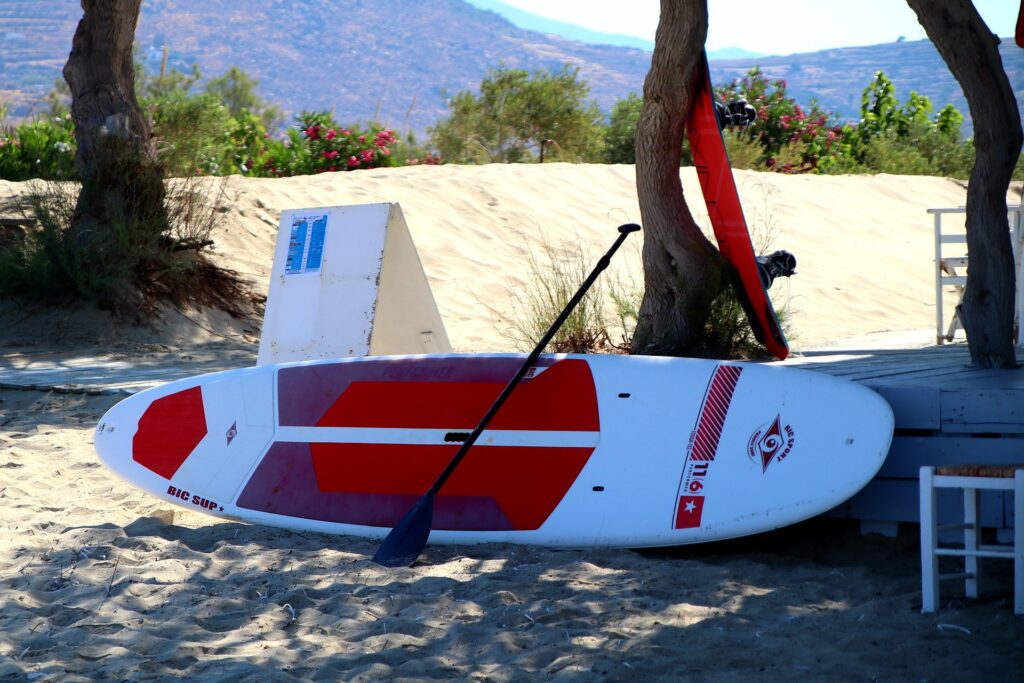
Whether you’re a beginner or an experienced paddler, this guide will help you navigate the process of selecting the ideal paddle board that suits your needs, skill level, and intended use.
Now you’re most likely asking yourself what paddle board is best for me, or what paddle board should I buy? To attempt to answer this question you’re going to want to answer a few others. Don’t worry we’re going to make it as simple as possible so that you can be out on the water enjoying paddle boarding in no time.
1. Know Your Paddle board Types
Before diving into the buying process, it’s essential to understand the different types of paddle boards available so that you know what paddle board might be right for you:
- All-Round SUPs: Versatile and suitable for various conditions, making them ideal for beginners.
- Touring SUPs: Designed for long-distance paddling and stability, perfect for exploring lakes and rivers.
- SUP Surfboards: Shorter and maneuverable for riding waves in the ocean.
- Inflatable SUPs: Portable and easy to store, great for travelers and those with limited storage space.
- Racing SUPs: Sleek and built for speed, intended for competitive paddlers.
- Multi-Person SUPs: These boards are suitable for multiple passengers where weight limits are best forgotten.
While inflatable SUPs or iSUPs are fantastic options don’t miss the section below in which we discuss the differences including the benefits and drawbacks of these popular board types.
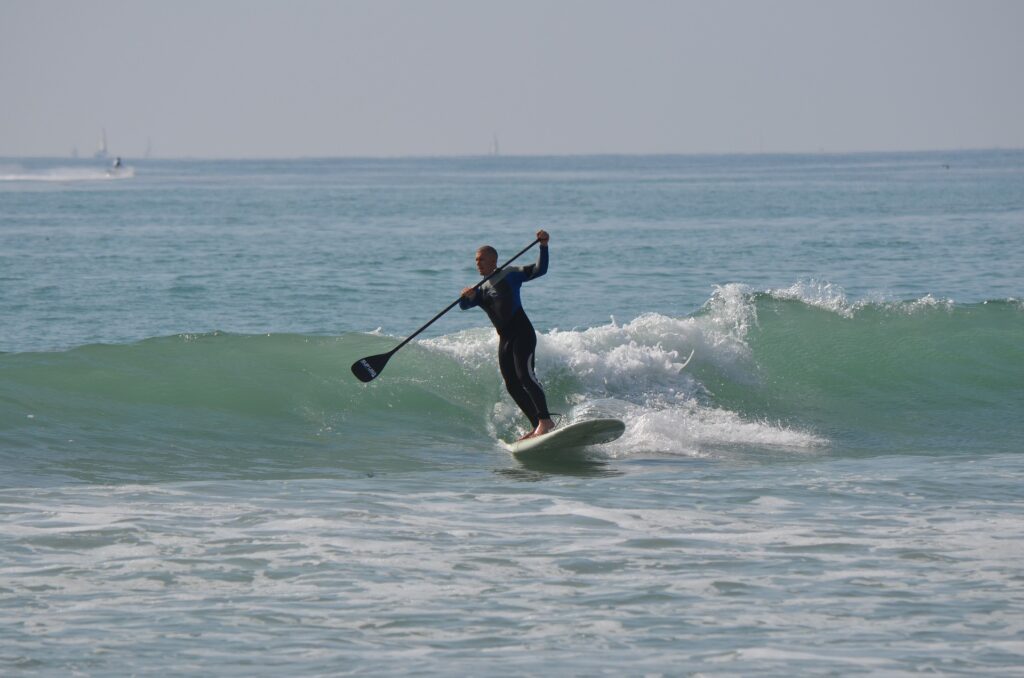
2. Determine Your Skill Level
Your experience level plays a crucial role in selecting the right what paddle board you should buy or what paddle board is best for you:
- Beginners: Opt for stable all-round boards that offer balance and ease of use.
- Intermediate Paddlers: Consider a touring or surf SUP to challenge your skills.
- Advanced Paddlers: Racing boards or specialized SUPs may be the right fit for your expertise.
Although you might be a beginner understand that other boards might suit your intended use more closely and although a beginner would normally purchase an allrounder if you’re someone wanting to tour or race you might want to look into cross discipline board so that you enjoy what you’re doing. There is nothing worse than wanting to just cruise the lake as a beginner with zero coordination on a board that’s got zero forgiveness to its stability.
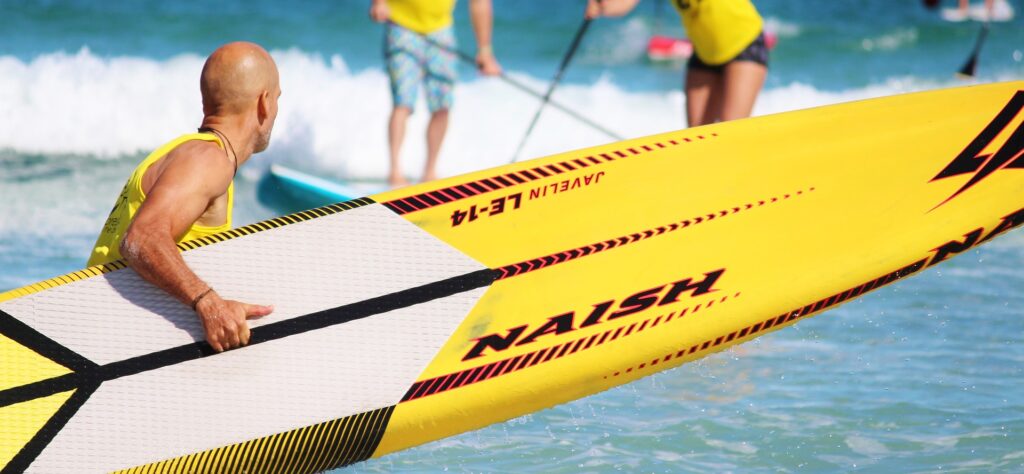
3. Know Your Intended Use
You’re going to want to understand your intended use. The intended use of your paddle board will greatly influence what paddle board is best for you. Although you might have many uses in mind lets focus on the most important to you. Are you looking at simply being on the water with friends and family, are you looking for longer outings with camping in mind? Or are you looking to practice yoga or enjoy a spot of fishing?
For a brief overview of the different disciplines look no further than HERE.
What paddle board looks right for you from the list below:
- Recreational Paddling: All-round boards are versatile for leisurely outings.
- Touring and Exploration: Choose touring SUPs for longer journeys and exploration.
- Surfing: SUP surfboards are ideal for catching waves.
- Fitness and Yoga: Stability and space are essential for yoga or fitness routines on the water.
- Fishing: Look for fishing-specific SUPs with attachment points for gear.
- Racing: Less stable these boards are built for speed, many can be used for down winding also.
Once you think you’ve decided what paddle board ask yourself another question would another board work best? When I asked myself, what paddle board should I buy the first thought and ultimately the decision I selected was a recreational paddle board.
A decision I almost immediately regretted. I didn’t regret it because it was wrong, just, I had other uses in mind. Touring and exploration were an additional love and the original board I had purchased didn’t allow me to carry a lot of equipment. The volume of the board was too low (we’ll discuss this later), the board also didn’t have enough places to secure equipment that I would need to take to explore.
Does that mean you need a fishing-specific SUP? Not at all, if the occasional fishing venture is something you crave then recreational and touring boards could meet your needs as these can carry additional equipment, but space will be more limited.
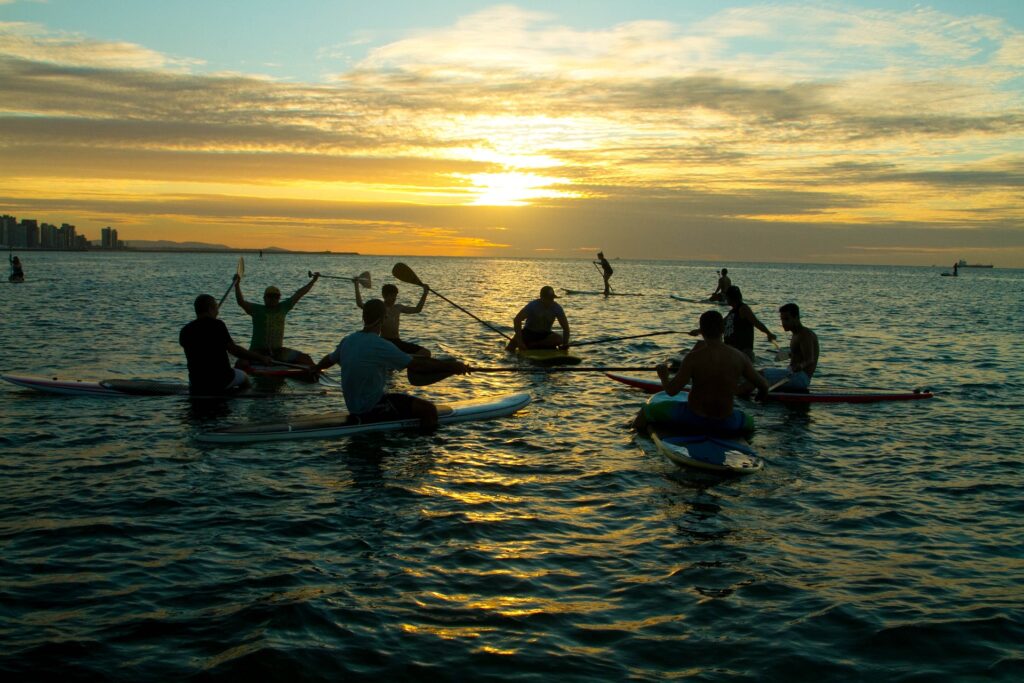
4. Consider Board Size and Dimensions
When asking yourself “what paddle board should I buy,” the board size will directly affect stability and performance:
- Length: Longer boards provide better tracking and speed, while shorter boards are more maneuverable.
- Width: Wider boards offer more stability, while narrower boards are faster but less stable.
- Thickness: Thicker boards can support more weight and often provide better stability.
When considering size and dimensions understanding their impact on your board of choice is important. We will discuss this further later but in in a nutshell, the dimensions of a board can be used to calculate the volume of the board itself. Volume is measure in liters (L) where 1L is equal to 1kg of body weight therefore for a board to float the volume must equal the riders weight or the riders weight be lesser than the total volume.
In many cases board manufacturers provide the volumes of their boards but understanding the relationship between volume and rider weight is important.
5. Think About Inflatable vs. Hard Boards
Both inflatable and hard/rigid paddle boards have their merits:
- Inflatable SUPs: Portable, easy to store, and durable, making them excellent for travel and convenience.
- Hard SUPs: Generally offer better performance, stability, and responsiveness but may require more storage space.
While iSUPs can be carried easily rigid boards are generally better for riders that are carrying a little extra weight on their frames. Rigid boards will last longer if properly cared for but do require additional equipment like roof racks for example and cannot be stored as easily.
6. Weight Capacity Matters
Ensure that your chosen board can support your weight and any additional gear you plan to bring along. Most SUPs list weight capacity in their specifications as mentioned earlier look for their volume.
Let’s discuss a brief case example. If a rider’s weight is equal to the volume of the board with all clothes and equipment the board will float even with the water level. If the weight is greater than the volume of the board the board will start to sink beneath the water level.
As such it is important to purchase a board that can carry the rider and any passengers and their equipment mass. Again, to clarify 1L = 1kg of mass. Lastly the height above or below the water level will affect way in which a board performs in the water. A water line that’s level with the top of the board will cause more drag and is therefore slower making it great for Surf SUPs. However, a waterline that’s beneath the top of the board will allow for additional speed and less effort to paddle longer distances.
7. Test the Board if Possible
Whenever possible, try out the paddle board before purchasing. Many retailers offer demo days or rental options, allowing you to assess how the board handles in the water. This is very valuable in deciding what paddle board is right for you.
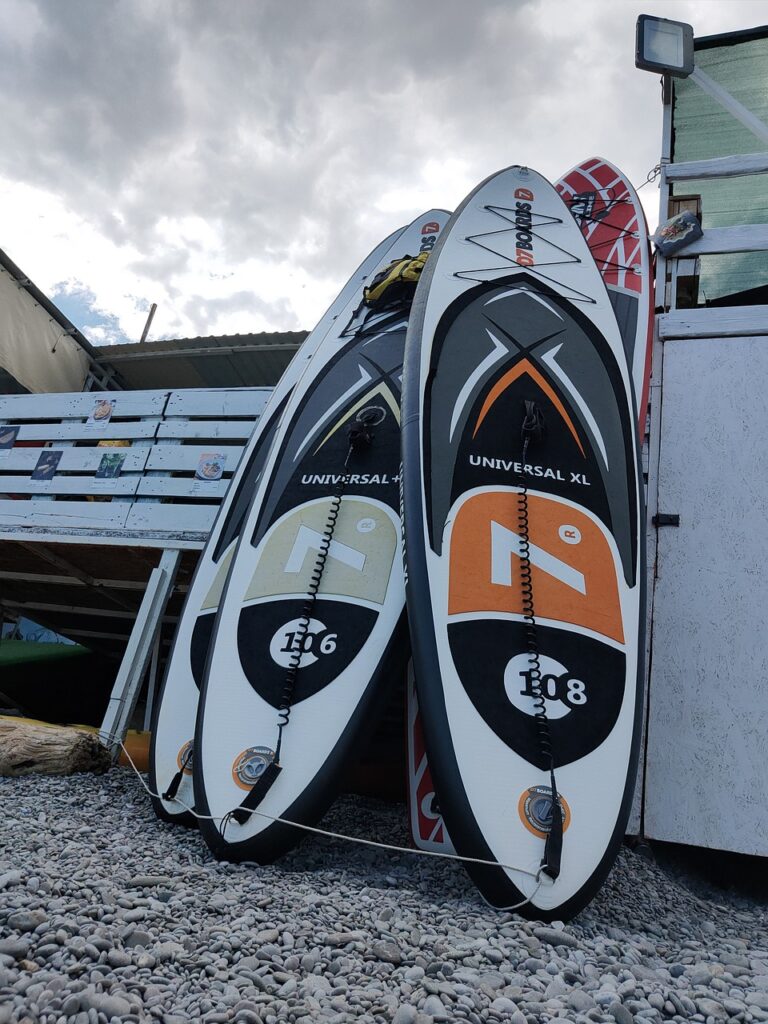
8. Examine Build Materials
Board materials influence durability and performance:
- EPS Foam Core: Lightweight and durable, often used in hard paddle boards.
- Inflatable Materials: High-quality drop-stitch technology ensures rigidity and durability in inflatable SUPs.
- Composite Materials: Epoxy and fiberglass constructions offer lightweight and performance-oriented hard boards.
9. Check for Additional Features
Consider any additional features you might need:
- Bungee Cords: For securing gear or accessories.
- Paddle Holders: To secure your paddle when not in use.
- Attachment Points: For adding accessories like fishing gear or yoga straps.
10. Set Your Budget
Paddle boards come in a wide range of price points. Determine your budget beforehand but remember that investing in a quality board can pay off in terms of durability and performance. An important fact to mention is that although you do indeed get what you pay for that doesn’t mean someone looking at getting into racing should immediately head out and purchase a top-of-the-line paddle board as these can cost thousands of dollars.
Instead purchase what is right for you and your wallet. This sport is meant to be fun not a cause for bankruptcy you’ll enjoy it far more if you can afford the gas to reach the bodies of water.
11. Read Reviews and Seek Recommendations
When attempting to determine what paddle board to buy research online reviews and ask for recommendations from experienced paddlers or instructors. Real-world experiences can provide valuable insights. There are many great groups on Facebook which amazing people who are willing to provide actual experience with plenty of the boards on the market.
12. Warranty and Customer Support
Check the warranty and customer support offered by the manufacturer. A solid warranty can provide peace of mind in case of defects or issues when deciding what paddle board to select.
13. Transport and Storage Considerations
Think about how you’ll transport and store your paddle board. Ensure it fits in your vehicle or storage space and consider accessories like board bags or roof racks.
14. Environmental Considerations
As paddle boarding often takes place in natural environments, consider the environmental impact of your board choice. Some brands prioritize sustainability and eco-friendly materials.

15. Conclusion
In conclusion, choosing what paddle board is perfect for you requires careful consideration of your skill level, intended use, budget, and personal preferences. Take your time to research, test, and consult with experts or experienced paddlers. Ultimately, the right paddle board will enhance your SUP experience, providing years of enjoyment on the water. Whether you seek adventure, relaxation, or fitness, there’s a paddle board out there that’s just right for you.
We’re always looking to provide you with content that you love, if you have a question you’d like to have answered or have a topic you think would make for an amazing article or video we would love to hear from you HERE.
For now, stay safe and check back frequently to see WhatSUP!

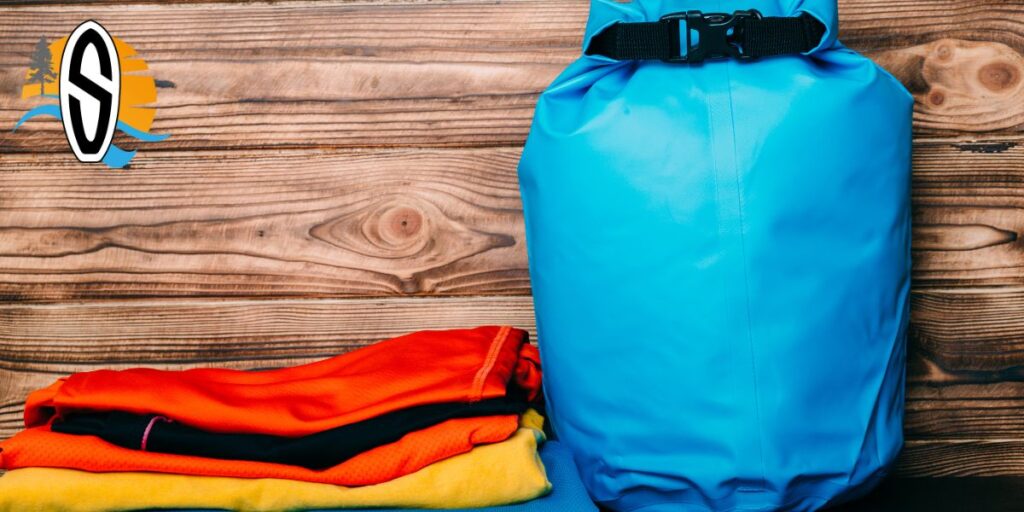
Hi Sully……..love this article
Thank you for your kind review of our article. We hope that it was informative and helpful in providing guidance towards the type of board you might enjoy!